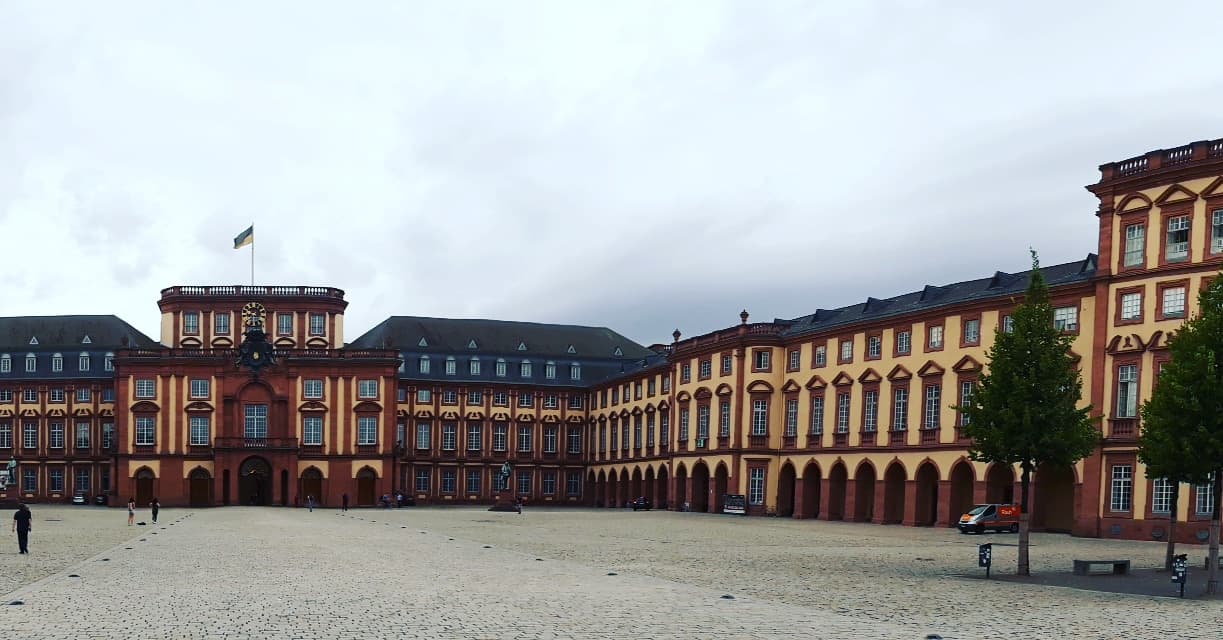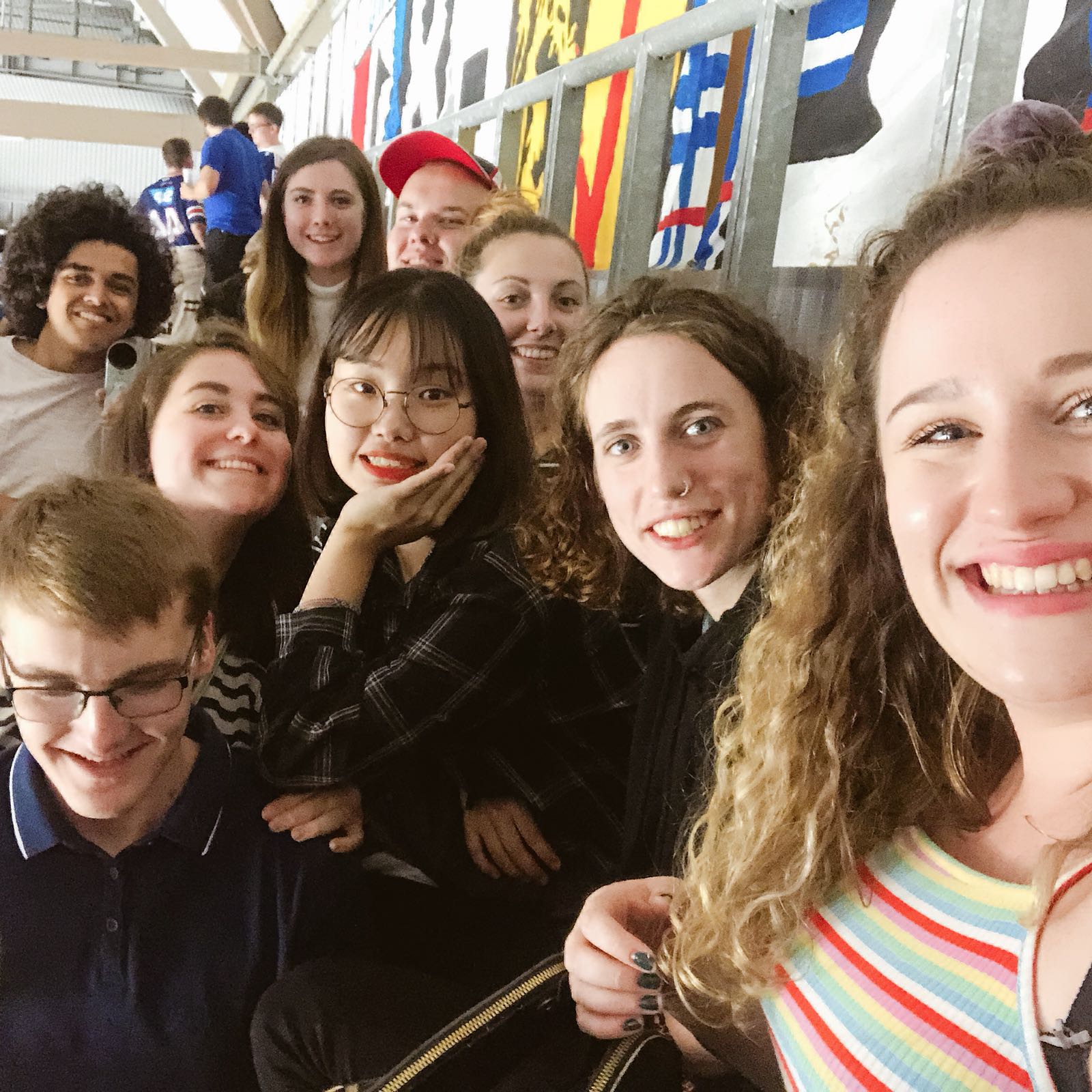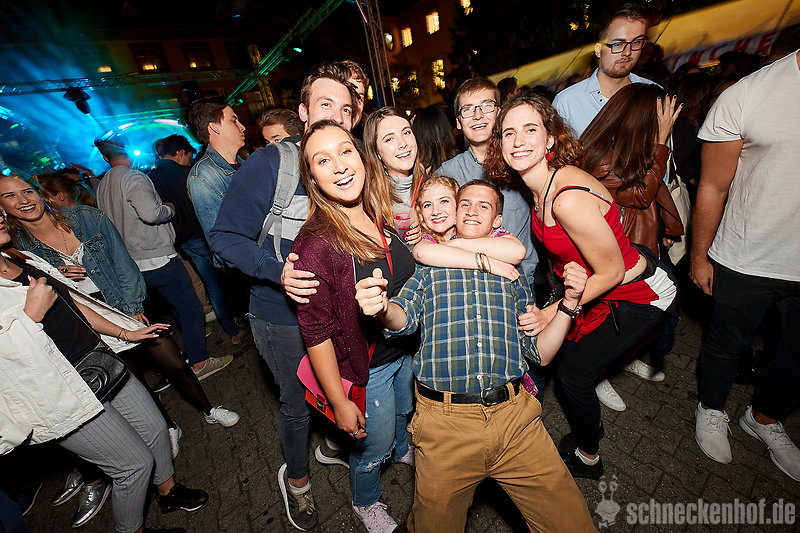15. March 2019
Comparison: Leeds vs Mannheim
Hey!
Today's post is a bit different to normal. After nearly 9 months of studying abroad, I thought it was about time I compared my experiences from my home university (University of Leeds) and my exchange university (Universitat Mannheim). Although I am absolutely loving my time at Mannheim, I do miss Leeds and the university (and sometimes even Economics) a lot and from this post I hope you'll see why! Here, I'm going to summarise some of my favourite things from both cities and unis, focusing on what they're like for internationals, as well as compare living in the UK with Germany.
.jpg)
So, let's get straight into it. There are some differences between the two countries and even the two cities that you might not consider at first thought. The most obvious is the language; people mainly speak German on the streets in Germany and English on the streets in the UK. This was fine for me until people started asking directions and I couldn't remember the German for ‘go straight ahead'. People in Leeds do seem to be a bit more smiley than people on the streets in Mannheim who automatically look away or frown if you look like you're trying to be overly friendly (and if it's their dog you smile at you may even get a death stare). This does not, however, mean people in Mannheim are unfriendly, I just don't think they're use to the level of stranger-stranger friendliness you encounter on the streets in the North of the UK! Another difference that I hadn't really thought of is general local customs. Firstly, although this doesn't always apply, it's best to avoid crossing at a red man in Mannheim, even if there is no car in sight because you may get shouted at by an angry parent or worse the police. It is illegal to cross at a red light here, something which is not really an issue in the UK. There's also a strong difference in alcohol rules which is useful for a German to know before coming to the UK. With the exception of trains, you're not really allowed to drink in public in the UK, don't pull your Wegbier out on the bus or tram or even on a walk along city streets. Usually it's fine to sit in some public parks (provided you're over 18) and drink with your friends provided you're not being overly rowdy and it's not at night which can look quite dodgy! Wandering around drinking alcohol is frowned upon and can sometimes cause trouble with the police.

One of the main things I miss about being in the UK though is tap water. You can 100% drink the tap water in both countries without issue but, for some reason, in Germany they will not give you it anywhere for free. In a restaurant you have to pay for water, and it will always come in a bottle, there are also very few places where I have seen water fountains to drink from or fill bottles. I basically only drink water and having to pay 3 euros extra to have it with every meal when I could just get it from the tap at home depresses me! This is especially surprising from a country that is so strongly into recycling that every house has 3 separate internal bins and you can very easily be shouted at in the street for putting a piece of card or a bottle in a normal bin! Within the University at Leeds there are water refill points everywhere and they are even considering banning sales of plastic water bottles in their shops. Furthermore, in the UK you can always ask for tap water in restaurants, bars and clubs and it will always be free.
The strangest difference when it comes to University though is what to do at the end of a lecture. For me, everyone suddenly knocking on their desk was confusing and slightly frightening! However, this is the custom at the end of every class in German universities in the place of clapping. If you are a German student, it's probably wise to avoid doing this at the end of classes in the UK; it is likely people will look at you weirdly! UK students don't tend to react at all at the end of lectures or seminars unless they are delivered by students.

Now, on to some of the most important things for exchange students and just some interesting things I've realised whilst studying in both these places!
One of the most interesting things about Mannheim is that you can wake up everyday to the smell of chocolate! Thanks to a chocolate factory located on the Neckar, often the whole city smells of melted chocolate. If you want to be reminded of this while studying in Leeds, all you need to do is hop on a train to York and visit the York Chocolate Factory! The best thing is that there is not only the smell of chocolate from this York factory, but you can also taste it- lots of it! Leeds has great links to many cities and attractions in the UK as well as having it's own airport if you want to travel further. Cities like York, Manchester and Sheffield are close-by and it's easy to visit the Great British countryside as the Pennines easily accessible for keen hikers. If you're looking to explore capital cities, London is also only a 2hr 15 minute train away, Edinburgh is a 3 hour train ride and you can fly to Belfast or Dublin from the local airport in less than an hour! Wales is a little bit further away but still do-able!

Mannheim also offers great travel opportunities which is one of the reasons I picked it for my year abroad. You're able to easily travel by train, flixbus or plane to destinations all over Germany and Europe. If you book in advance (or do long bus journeys) this can be really cheap too!
The year (or semester) is called study abroad for a reason however and although there is plenty of time to travel and enjoy the city, I would recommend attending your lectures and studying at least a little bit. Both universities have a lot to offer exchange students with university wide electives as well as a large choice of subjects within your own faculty. Leeds is the perfect place for students wanting to try new things as exchange students have access to the discovery module catalogue; modules from all university faculties that are open to any student. These include everything from alcoholic beverage making to web programming for beginners, Videogames: Identities in Play to a Community Engagement Project. Some of them do have pre-requisites though so it's worth fully exploring these first.
.jpg)
As Mannheim is about a third the size of Leeds and is comprised of less schools, the choice of electives is much lower but there's still lots of interesting subjects to choose from including Intercultural Communication and Forensic Psychology in Legal Contexts! Cultural courses are also offered for a small fee and include courses about Germany, the EU and even German art, included in this section are also language classes from complete beginner to nearly fluent. Mannheim and Leeds also slightly differ in their teaching styles. Lectures are nearly identical in both universities although the average length in Mannheim is 90 minutes compared with 50 in Leeds. However, seminars in Leeds tend to be more interactive than Mannheim seminars. Mannheim also offers intensive seminars which you won't find on the Leeds curriculum. These are classes you attend for more hours over fewer days meaning they are done much more quickly but you have to learn everything in one go. These are also sometimes purely made up of student's presentations rather than any teaching.
Another thing to be aware about when it comes to studying and exams is the difference in credit systems! Credits are easily transferable between both universities but where most European universities, including Mannheim, use ECTs, UK universities use credits. Generally, a full semester is 30ECTs in Mannheim and 60 credits in Leeds. Mannheim courses can each give you anywhere between 3 and 8ECTs whereas Leeds courses will be either 10 or 20 credits. Usually 20 credit Leeds courses go over 2 semesters although this is not always the case. When it comes to exams, it is easy to choose modules at both universities based on your strengths: if you prefer exams over coursework (or vice-versa) then you can read about the examination method in the module catalogues. If you are taking exams be aware that in Mannheim, the winter exam period is in December and the Summer exam period is in June whereas in Leeds the winter exams tend to be in January (after winter break) and the summer exam period starts in May. Both universities have a winter break and a break in spring for Easter but in Leeds, depending on your course you may also get a reading week in the semester where you are not expected to attend lessons.
Both universities are perfect for international students. VISUM in Mannheim provide a buddy service for exchange students to help them meet German students, find their way around the city and even practice the language. They also plan trips, events and parties for Mannheim's international community and run Social Erasmus, a society that helps Erasmus students give back to the community they are studying in. The Mannheim campus has German and English as it's official languages which ensures you can get around easily and ask for help when it's needed. The international office also run cultural courses specifically for internationals and offer incredibly cheap trips to cities such as Frankfurt!

In Leeds, International students get their own freshers week to help them settle in before everyone arrives and lessons start. University Ambassadors are also available to meet you at the airport or train station and help with settling in. Every Monday, Global café is hosted in the union where students can go, have tea and biscuits, play board games and chat to make friends and learn about different cultures. Trips, specifically aimed at exchange students but open to all are organised by both the Study abroad office and the ESN Erasmus and International Exchange student society. These include hiking in the Pennines and day trips to places such as Whitby, Edinburgh and Newcastle. The society also host parties, socials and British culture events for international students.
Societies are an important part of both universities. As mentioned, there are societies aimed exclusively at exchange students but there are also plenty of others to get involved with. Pretty much every Leeds talk I went to when choosing university highlighted their Quidditch society but in Mannheim that's not so special as they have one too! In Leeds there are over 320 clubs and societies (known in Mannheim as Initiatives) to get involved with, ranging from cultural and school-based societies to sport, campaigning and general interest. Some of my top picks are the baking society, the food society (are you sensing a theme?) sign language society and Women in Leadership but there really is one for any interest. It's also useful to join your school society to meet others doing your subjects. In Mannheim there are both English and German speaking initiatives. I have only been involved with the exchange student ones highlighted above but there's always flyers around for other interesting societies which would definitely be worth a try if you have more free time than I do!
.jpeg)
As an international student, the housing situation in Leeds is better than Mannheim! Both universities had dedicated housing advice teams and you will not go homeless, but Leeds offers student accommodation to all incoming exchange students meaning you don't have to worry about finding it yourself. That is an option though, if you don't fancy student halls Leeds have plenty of student houses available for rental. In Mannheim there are both student halls and private accommodation also available, but University accommodation is limited and not necessarily allocated to exchange students so websites like WG Gesucht may be needed to find a private apartment.
.jpg)
One of my favourite things about both cities is that they are abundant in cafes and restaurants! If you've read any of my other blog posts, you will appreciate my love for all things food-related and both these cities are perfect for that. In Leeds there are cafes everywhere; in the university, at the front of the university, in the city centre, hidden in backstreets and even on the outskirts of the city. These offer cake, British and non-British tea, coffee, hot chocolate and usually also sandwiches and snacks. My absolute favourites are Hepworth's Deli and Kitchen (which also does an amazing brunch); Olive & Rye; Mrs Atha's; Café Opposite and, of course, Common Ground in Leeds University Union. In Mannheim, there are also hundreds of cafés dotted around the city centre and surrounding areas such as Jungbusch and Neckarstadtwest. The best of these include Café L3, café Vienna (more for a meal than cake but sooo cheap), Bolands and Café Sammo.
.jpg)
Both are also full of restaurants with food from all over the world as each city is incredibly multicultural. This means you will always find something you fancy eating. Even vegetarians and vegans are safe in both cities where more and more specialist veggie restaurants are popping up! Try Bundobust, Roots and Fruits or Humpit for some of the best in Leeds and Kombuse, Heller's or Burrito Baby for my favourites in Mannheim. When in the UK, I would also recommend having an afternoon tea at least once, just like you can't really leave Germany without trying Wurst and Brezels, it'd be wrong to leave England without having an afternoon tea!
.jpg)
Sticking with the food theme, both cities have similar living costs when it comes to groceries with each having Aldi and Lidl available for shopping alongside bigger supermarkets. My average food shop in both places comes to just under £20 (23 euros) a week and I (usually) cook from home most days. If you're not that excited about cooking but also don't want to pay for a restaurant, some of Leeds student accomodation's are catered meaning your meals are included in the rent! Just go to the on-campus refectory or other campus outlets for your daily meals. Even if you're not in uni accommodation, there are plenty of on-campus lunch and dinner options. The refectory is open to all, not just catered students and offers a large choice of foods from across the world every day. In Mannheim, the Mensa is available for students to buy large, cheap meals every weekday.
Leeds is a campus university meaning all the buildings are in one place. The campus is rather large but there are maps everywhere that help you find your way and there will always be someone around willing to direct you to where you need to be. It is also in a very handy position within Leeds, being right next to the city centre meaning you are less than 5 minutes away from the nearest supermarket and all the cities shops, restaurants, bars, cinemas, museums and art galleries.

The union at the centre of campus is also the perfect place to go for directions or advice of any kind about student life, studying, jobs, housing, money or extracurricular activities. This is something that I've missed in Mannheim; the student community feel in Leeds is a lot higher, especially because of this big building that basically contains everything you'll need on a day-to-day basis. The union building not only includes all these advice channels, but it also has two bars: terrace, a restaurant with an outdoor terrace area perfect for sunny days and old bar which is more like a classic English pub with the food to go with it. Alongside this, the union features a café; a shop with food, stationary and household items; a bank; a hairdressers; a few different fast but healthy food places and multipurpose rooms for sport and dance societies, shows, conferences, movies and everyone's favourite, Fruity on a Friday night! Fruity is the universities club night which is held within the rooms underneath the union, with each room having its own genre of music.
.jpg)
Although Mannheim does not have this kind of area within its buildings, the university is directly in the city centre meaning access to banks, shops, hairdressers and food places is easy. Alongside this, they do have an active counselling service available in case advice of any kind is needed and a friendly team who specialise in answering queries from international students. They even host an event to rival fruity: Schneckenhof. Schneckenhof parties are held in warmer months of the year in the courtyard of the main university building. They feature a live DJ set and drinks served from tents, each week the Schneckenhof is organised by different faculties and societies which gives way to different themes and music genres. It's the perfect place to go with friends on a Thursday night and you will almost always make new friends too!

Leeds will always be my favourite university city but Mannheim has also completely captured my heart! If you're thinking about study abroad then my only advice is DO IT! I haven't heard of anyone who hasn't had an incredible time and I absolutely love it. Both of these Universities are the perfect place to look. Applications to study in Leeds for September 2019 start are due by 31st March 2019 or 15th April 2019 for Erasmus+ students. For spring semester 2020, all applications must be in by October 31st! If you want any further information check out: Leeds Study Abroad or DM me on Instagram To get more information about Universitat Mannheim's exchange programme click here!
.jpg)

